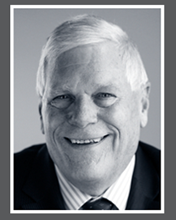Robert Wright (KC)

"My job as Crown Counsel means my main obligation every day is to do the right thing. It is a great luxury as a lawyer to never have to take a position that I do not believe is right, fair and just. Working in public service provides fulfilling and incredibly interesting work while surrounded by talented and passionate people."
Robert Wright received the Legacy Premier’s Award in 2014 and was inducted into the Hall of Excellence in the same year. His legal career and distinguished service to the Ministry of Justice’s Criminal Justice Branch, the Province of B.C. and the Canadian justice system represent the highest levels of commitment to which a Crown Counsel can aspire. Robert demonstrated the ideals of justice and leadership, public service and community involvement and improved the effectiveness of the criminal justice system as a whole. His professional achievements, spanning over 35 years, are an inspiration to legal counsel across B.C., Canada and beyond.
Robert regularly assisted police and Crown Counsel with evidentiary and strategic issues which arose in the course of a prosecution. He built an extraordinary legacy in the education of lawyers and other justice professionals.
As executive director of the Criminal Justice Branch’s Crown Law Division, Robert guided design and implementation of the branch’s Major Case Management Model, a significant justice reform to apply best practices to large, high‐profile cases for a just and efficient outcome.
Of the countless criminal trials Robert has been involved in, one of the most prominent and significant trials is that of the Air India bombing. From 1997 to 2005, he was lead trial counsel for the prosecution, B.C.’s first mega‐case, a case of unprecedented global scale and complexity. He assembled a legal team of 17 lawyers and a group of administrative professionals and pioneered the use of a project management approach to large prosecutions in Canada, among other legal and administrative innovations.
In addition, Robert’s unique relationship with the defence team is probably the main reason the prosecution came to a verdict on its merits within a reasonable time when far less complicated or serious cases were still languishing in court.
Robert demonstrated a visionary and empathetic leadership style, providing both new and experienced branch lawyers, administrative staff and other members of the justice system with an outstanding example of public service.

